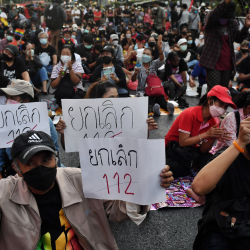Why are video games so often blamed for mass shootings?

As Thai authorities try to uncover the motive behind a 14-year-old suspect’s shooting spree at the Siam Paragon shopping mall in Bangkok on October 3rd, some media outlets have discovered that the suspect had a game addiction and mental health issues.
Oftentimes, video games have been blamed for mass shootings, as many of them depict acts of violence which may trigger players to commit crimes in real life.
-It’s unfair-
In light of the recent shootings, “Don’t blame video games” was one of the top-trending hashtags on social media in Thailand, where netizens complained that not all players will commit violent crimes in real life after playing video games.
Among the first to speak up was the Progressive Game Industry. They claim that some media outlets, reporting that a perpetrator is a “game addict”, creates a misconception that all game enthusiasts will commit violent crimes. This, they say, has significantly damaged the reputation of Thailand’s gaming industry.
“I think it’s unfair,” says Sasimaporn Pagdeepudsa, CEO of Thai gaming platform Gamiqo and a representative of the Progressive Game Industry, a collective which aims to elevate the gaming industry and e-sports in Thailand.
“Normally, when we blame something, we must find out the facts and analyse the main cause. Not all game addicts are violent or have aggressive behaviour. So, I think it’s inappropriate to use the term “game addicts” when talking about perpetrators committing violent crimes.”
Another representative of the Progressive Game Industry, Mansharee Srivichai, who is an E-sports teacher at a local school in Samut Prakan, also feels that it is unfair to stigmatise all game enthusiasts for violent crimes. She noted, however, that the existing belief probably stems from adults’ negative perception of video games, especially those that depict gun violence, believing that games are unproductive compared to other educational activities.
In particular, parents often find difficulties dealing with their children who are glued to their computer screens playing video games all day and night. In the old days, Internet and gaming cafes were often seen as a place where “bad” students jump classes and gather only to play games, which only exacerbates the problem.
“When people think of games when such crimes occur, we only look at certain types of game and judge the whole industry,” complained Mansharee.
“This became an image on which everyone judges us, but people seem to forget that games are in everyone’s daily lives. We haven’t even included those who play games such as Candy Crush, Hay Day or even Solitaire, which have been installed ever since computers were invented.”
-Access to restricted games-
According to recent findings by global research firm Mintel, 76% of the Thai population spends at least one hour per day on games, while 36% spend two to four hours per day. This is enough to prove that games, both online and offline, are part of people’s everyday lives.
“Thailand’s gaming market comprises more than 30 million people and there’s no way that all of them are youths,” said Mansharee.
As to whether video games can really incite people to becomeviolent or aggressive, the President of the Thai eSport Federation, Santi Lothong, believes that this depends on the individual.
“If that person is into violence to begin with, anything can arouse them to become violent,” said Santi, adding that his biggest concern is the youth, as their maturity and judgment are not fully developed compared to adults and, therefore, are more likely to “copycat” what they have seen in games and the media.
“On the other hand, those with maturity won’t be easily aroused because they will be able to differentiate between what can be done in real life and whether it’s just a video game.”
Restricting underage players from accessing games with violent material, however, remains a question. On this matter, Santi wondered how the shooter manage to access such violent games, notably “Battle Royale” games, which are usually age-restricted.
In fact, the Ministry of Culture has a rating system, which classifies all video content, including games, based on the suitability of the audience. Santi noticed, however, that there is no punishment for the underage accessing age-restricted games, adding that the Ministry does not have the authority to punish underage players.
“We have seen a rating system that the Ministry of Culture has imposed, which restricts underage players from certain video games, especially games with 18+ ratings. It’s just a rule, but there is no punishment when someone violates it, so nobody cares because they think they can still play these games. That means small children, under parental supervision, can still play these games.”
-Then what’s to blame?-
Although there have been studies proving that game addiction can have negative impacts on mental health, such as aggression, anxiety and depression, there are still not enough studies proving that it can actually trigger mass shootings.
A psychology expert, Assistant Professor Dr. Nattasuda Taephant, said that there are numerous culprits behind such an incident. Dr. Nattasuda assessed that game addiction is only one aspect of the perpetrator’s behaviour. Therefore, other factors must be taken into account to discover the root cause of the shootings, such as the state of their mental health, upbringing and their environment.
The psychology expert also felt that the frequency of mass shootings and violent crimes reflect that the overall mental health of Thai people is deteriorating.
“When we try to discover the reason behind the shootings, it’s hard to say which one it is. If we judge that games are to blame, however, that means we don’t fix anything else, which in fact, is incorrect, because game-addiction is just one aspect of the perpetrator’s behaviour. It is true that games can play a role, but not all online games contribute to that kind of aggression.”
-Prevention?-
In fact, games should not always be blamed for violent crimes and not all games will trigger people to become violent. What is far more of a concern, however, is copying certain acts from games, movies or other media they have seen.
Therefore, Dr. Nattasuda believes that parents and teachers should play an important role in providing guidance for their children, such as teaching them how to differentiate between what they have seen in the media and what can or cannot be done in real life.
“The most crucial part is communication and guidance from parents, or whoever they are close to,” said Dr. Nattasuda. “We also have to screen for them, based on the suitability of the media for their age, and closely guide them as to what might happen to them if they play a certain game or watch certain movies.”
Additionally, Sasimaporn also feels that the gaming industry is much more than playing games, adding that teaching youths to access games “safely” would be better than completely restricting access.
“Some people become professional gamers and earn income for themselves, while games can help develop their language skills and their ways of thinking. So, if we use games in the right way, they can help the youths develop their skills,” Sasimaporn concluded.
“Parents are their first coaches,” said Santi. “If parents are fully supportive, their children will be determined to do it well. So, they must pay close attention to them if children are involved in games depicting violence. Teachers should also tell their students about the positives and negative sides of gaming, and possible career paths in the gaming industry.”
Most importantly, if they notice that their children are at risk of game-addiction, they should never be afraid to seek mental health advice.
“I think parents should also guide their children about time management and how they can balance themselves, to prevent them from becoming game addicts,” Dr. Nattasuda advises.
By Nad Bunnag, Thai PBS World






